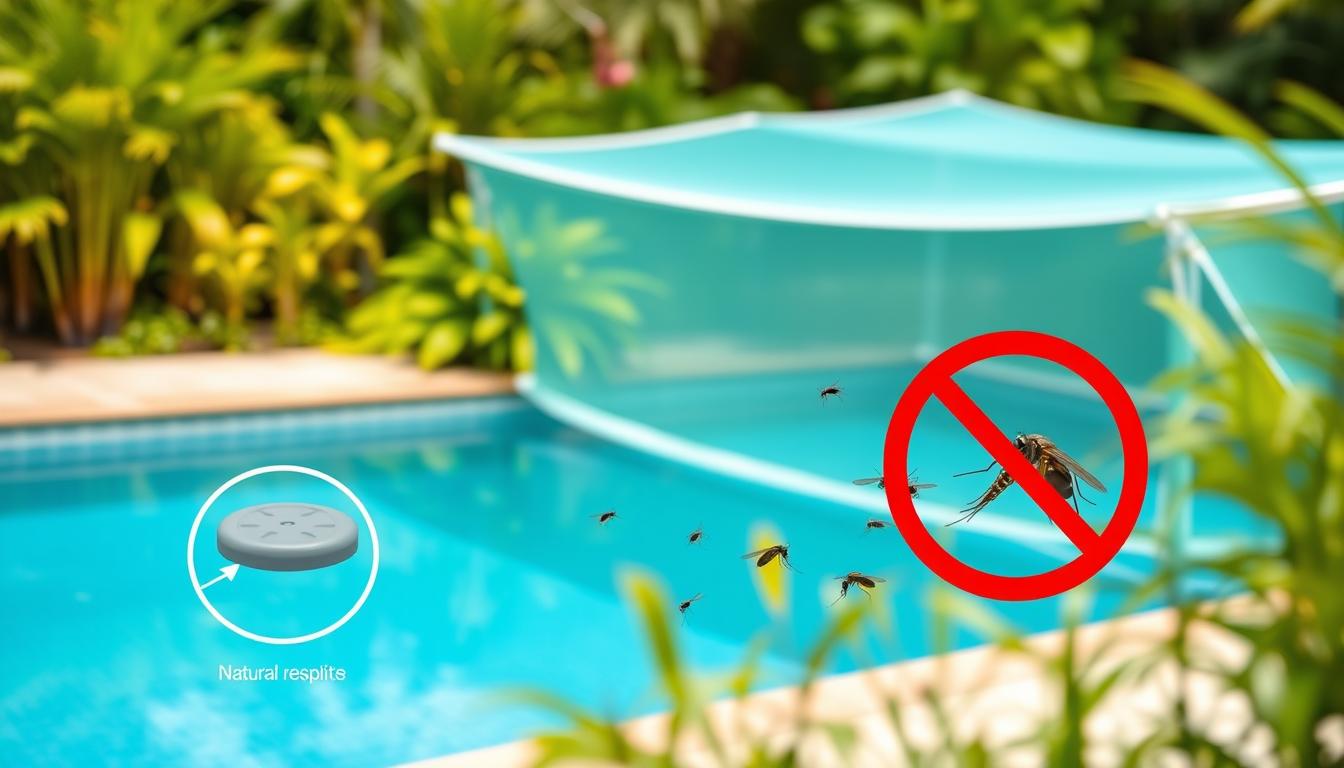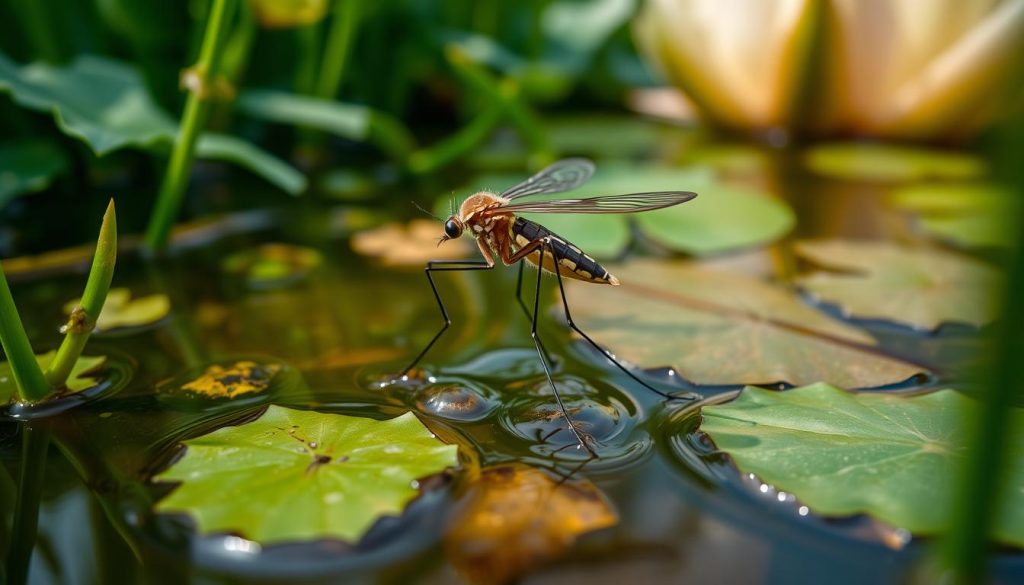
Mosquitoes carry diseases like Zika, West Nile, and dengue fever. They’re drawn to still water, including pools. Mosquitoes lay eggs in stagnant water, making uncared-for pools their favorite spots.
Pools with standing water are prime targets for mosquito egg-laying. This makes proper pool maintenance vital for preventing mosquito breeding.
Keep your pool safe by maintaining chlorine levels and running filters regularly. Remove standing water around the pool area to deter mosquitoes. Use insect repellents for added protection.
Consider professional pest management services to boost your mosquito control efforts. These steps will help reduce health risks from vector-borne diseases and ensure a fun swim.
Understanding Mosquito Breeding Habits
Female mosquitoes need blood to develop eggs. They seek specific conditions to lay eggs. This ensures the best survival chances for their offspring.

Stagnant Water: The Ideal Breeding Ground
Female mosquitoes prefer laying eggs in stagnant water. This water must stand for at least three days. Mosquito eggs and larvae can’t swim, so they’d drown in moving water.
Stagnant water often promotes algae growth due to sunlight exposure. This algae feeds mosquito larvae during their development. It makes stagnant water perfect for mosquito breeding.
Mosquito Life Cycle and Egg-Laying Process
The mosquito life cycle has four stages: egg, larva, pupa, and adult. Female mosquitoes can lay over 100 eggs at once. They deposit eggs on water or where water can rise.
| Mosquito Life Stage | Duration |
|---|---|
| Egg | 2-3 days |
| Larva | 4-14 days |
| Pupa | 1.5-4 days |
| Adult (male) | 6-7 days |
| Adult (female) | 6 weeks to 5 months |
Mosquito larvae, or “wrigglers,” live in water sources like pools and ponds. They eat organic matter and microorganisms. Algae growth provides a substantial food source for them.
The pupal stage lasts 1.5 to 4 days. Here, the mosquito becomes an adult. After emerging, it rests on water until its body dries.
Mosquito control involves eliminating existing infestations and preventing reinfestation through the eradication of larval populations.
Understanding mosquito life cycles helps us disrupt their reproduction. We can minimize the chances of them laying eggs in our pools and surroundings.
Factors Attracting Mosquitoes to Pools
Mosquitoes can turn a relaxing pool day into an itchy nightmare. Let’s explore what draws these pesky insects to our pools. Understanding these factors can help us minimize their presence.
Chlorine Levels and Mosquito Attraction
Poorly maintained chlorine levels can make pools inviting for mosquitoes. These insects love standing water for breeding. A pool with low chlorine becomes an ideal spot for mosquitoes to lay eggs.
Surrounding Vegetation and Nesting Sites
Landscaping around your pool can attract mosquitoes too. Overgrown bushes and trees offer cool, shady spots for mosquitoes to rest. These weak fliers seek shelter from wind in dense vegetation.
Regular trimming of plants near your pool can reduce potential nesting sites. This simple step can make a big difference in keeping mosquitoes away.
Poorly Maintained Pools and Standing Water
Neglected pools are like open invitations for mosquitoes. Stagnant water, algae, and debris create perfect breeding grounds. Even small puddles in pool toys can attract these pests.
Mosquitoes can reproduce in just a few ounces of water. Regular inspection and removal of standing water is crucial around the pool area.
| Attraction Factor | Potential Risks | Prevention Measures |
|---|---|---|
| Improper chlorine levels | Ideal breeding environment for mosquitoes | Maintain proper pool chemistry and chlorination |
| Overgrown vegetation | Provides resting and nesting sites for mosquitoes | Regularly trim bushes and trees around the pool |
| Standing water and debris | Attracts mosquitoes and supports egg-laying | Eliminate standing water and maintain a clean pool area |
Taking action against mosquito-attracting factors can lead to a better pool experience. Regular pool care, smart landscaping, and removing standing water are key. These steps will help keep those unwanted buzzing guests away.
Preventing Mosquito Breeding in Pools
Proper pool maintenance is key to stopping mosquitoes from laying eggs. Keep the filtration system running and chlorine at recommended levels. Use pool covers when not in use to reduce standing water.
Eliminating Standing Water and Debris
Clean your pool area regularly to prevent mosquito infestations. Skim the surface, vacuum the floor, and scrub the walls. Remove standing water from pool toys and nearby containers.
Store pool accessories in a dry place when not in use. This helps reduce the risk of mosquito breeding. Remember, mosquitoes can lay thousands of eggs in small amounts of water.
Using Mosquito Repellents and Professional Pest Control
Use mosquito traps, citronella candles, and bug spray for extra protection. These products help repel mosquitoes from the pool area. They make the space more enjoyable for family and friends.
For severe infestations, seek help from professional pest control services. Experts can manage mosquito populations and reduce health risks. This ensures your pool stays safe and fun all summer long.







